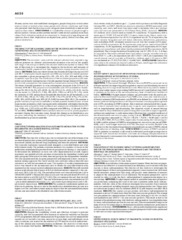Приказ основних података о документу
Budget impact analysis of introducing pharmacist-managed warfarin service in the republic of Serbia
| dc.creator | Stojković, Tatjana | |
| dc.creator | Bogavac-Stanojević, Nataša | |
| dc.creator | Marinković, Valentina | |
| dc.creator | Lakić, Dragana | |
| dc.date.accessioned | 2019-09-02T11:54:28Z | |
| dc.date.available | 2019-09-02T11:54:28Z | |
| dc.date.issued | 2016 | |
| dc.identifier.issn | 1098-3015 | |
| dc.identifier.uri | https://farfar.pharmacy.bg.ac.rs/handle/123456789/2683 | |
| dc.description.abstract | Objectives: A Pharmacist-Managed Warfarin Service (PMWS) is perceived as an efficient method for improving anticoagulation control and decreasing the rate of bleeding, thus reducing overall healthcare costs. What this study aims to assess is a five-year budget impact of providing PMWS instead of Usual Medical Care (UMC) to patients on warfarin at the secondary/tertiary level of healthcare facilities in Serbia. Methods: A budget impact analysis was performed from the payer’s per- spective (National Health Insurance Fund-NHIF), over a five-year time horizon. A reference scenario (UMC) and a new one (PMWS) were defined for a cohort of 18,067 insured patients taking warfarin, with the pre-assumed annual population growth rate of 20%, according to NHIF database. Direct medical costs included the acquisi- tion costs of warfarin, blood products and drugs for anticoagulation reversal, as well as hospitalization and monitoring. The expected values of annual therapy were based on the probabilities of patient being well-controlled or hypercoagulated, without any symptoms or with minor/major bleeding (pre-assumed incidence of the adverse events was once in a year, during 10 days). Results: The projected net cost savings have amounted to € 55,317, € 66,379, € 79,655, € 95,589 and € 114,704 for 2016, 2017, 2018, 2019 and 2020, respectively. Consequently, the total saving of € 411,644 could be achieved if PMWS was implemented, over a five-year period (2016- 2020), with a total budget reduction of 4.15%. The major economic benefits were attributed to the decrease of hospitalization expenditures in case of PMWS, related to the reduction of bleeding rates. ConClusions: Provision of PMWS instead of UMC to patients on warfarin could result in substantial net budget savings, due to improved both clinical and economic outcomes. Accordingly, this pharmaceutical service has much to recommend it for the implementation in the healthcare system of Serbia in the future. | |
| dc.publisher | Elsevier Science Inc | |
| dc.rights | openAccess | |
| dc.source | Value in Health | |
| dc.title | Budget impact analysis of introducing pharmacist-managed warfarin service in the republic of Serbia | en |
| dc.type | conferenceObject | |
| dc.rights.license | ARR | |
| dcterms.abstract | Стојковић, Татјана; Лакић, Драгана; Богавац-Станојевић, Наташа; Маринковић, Валентина; | |
| dc.citation.volume | 19 | |
| dc.citation.issue | 7 | |
| dc.citation.spage | A626 | |
| dc.citation.other | 19(7): - | |
| dc.citation.rank | aM21 | |
| dc.identifier.wos | 000396606301704 | |
| dc.identifier.doi | 10.1016/j.jval.2016.09.1610 | |
| dc.identifier.fulltext | http://farfar.pharmacy.bg.ac.rs/bitstream/id/10424/Budget_Impact_Analysis_pub_2016.pdf | |
| dc.type.version | publishedVersion |

